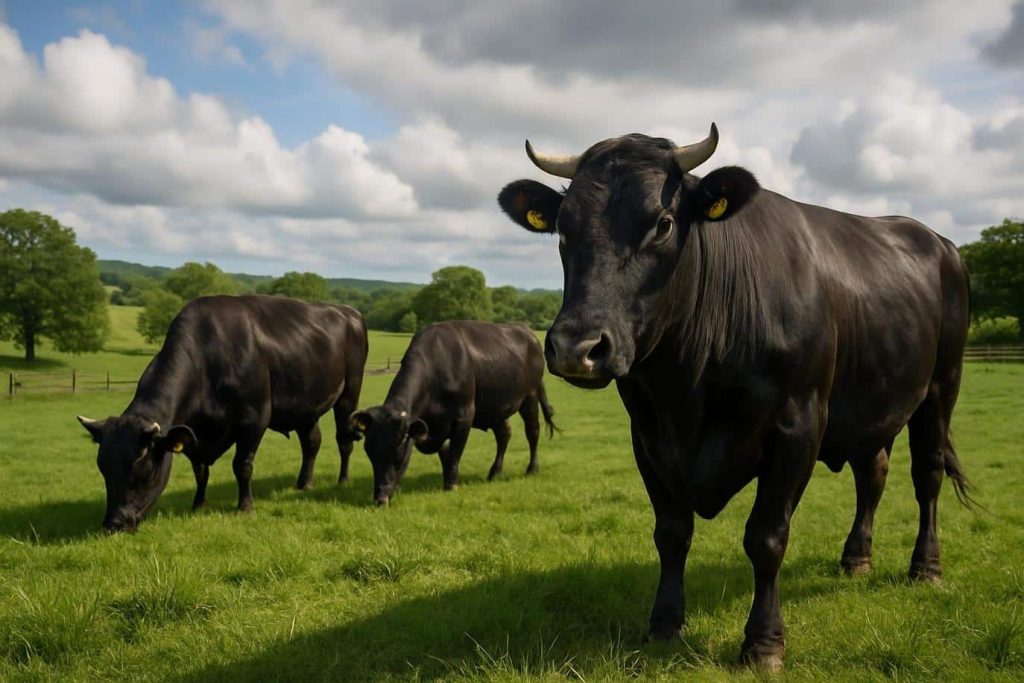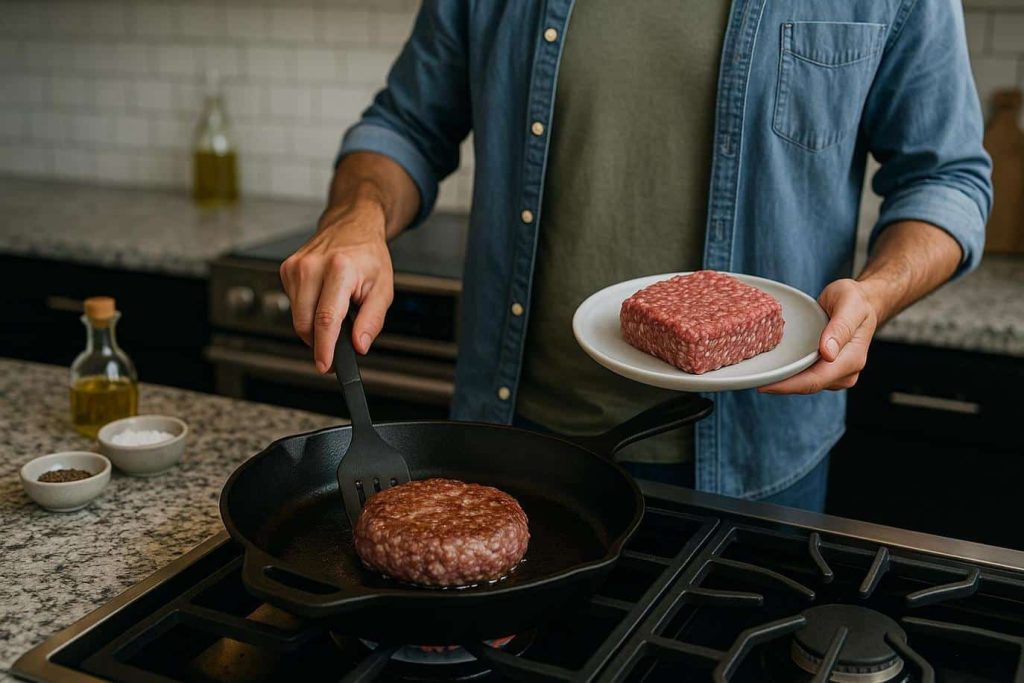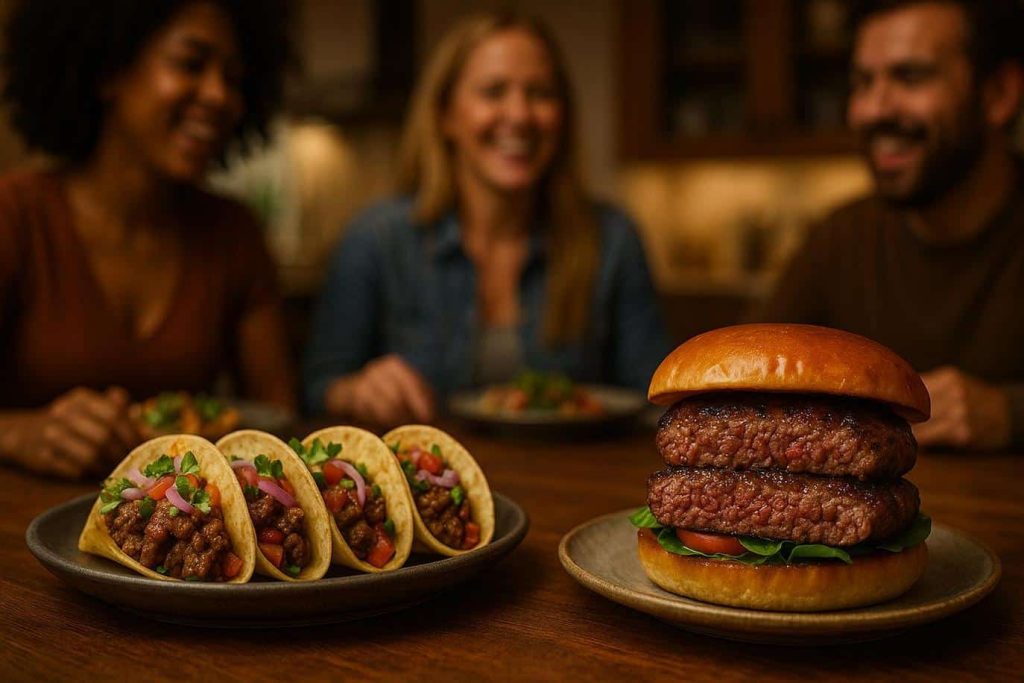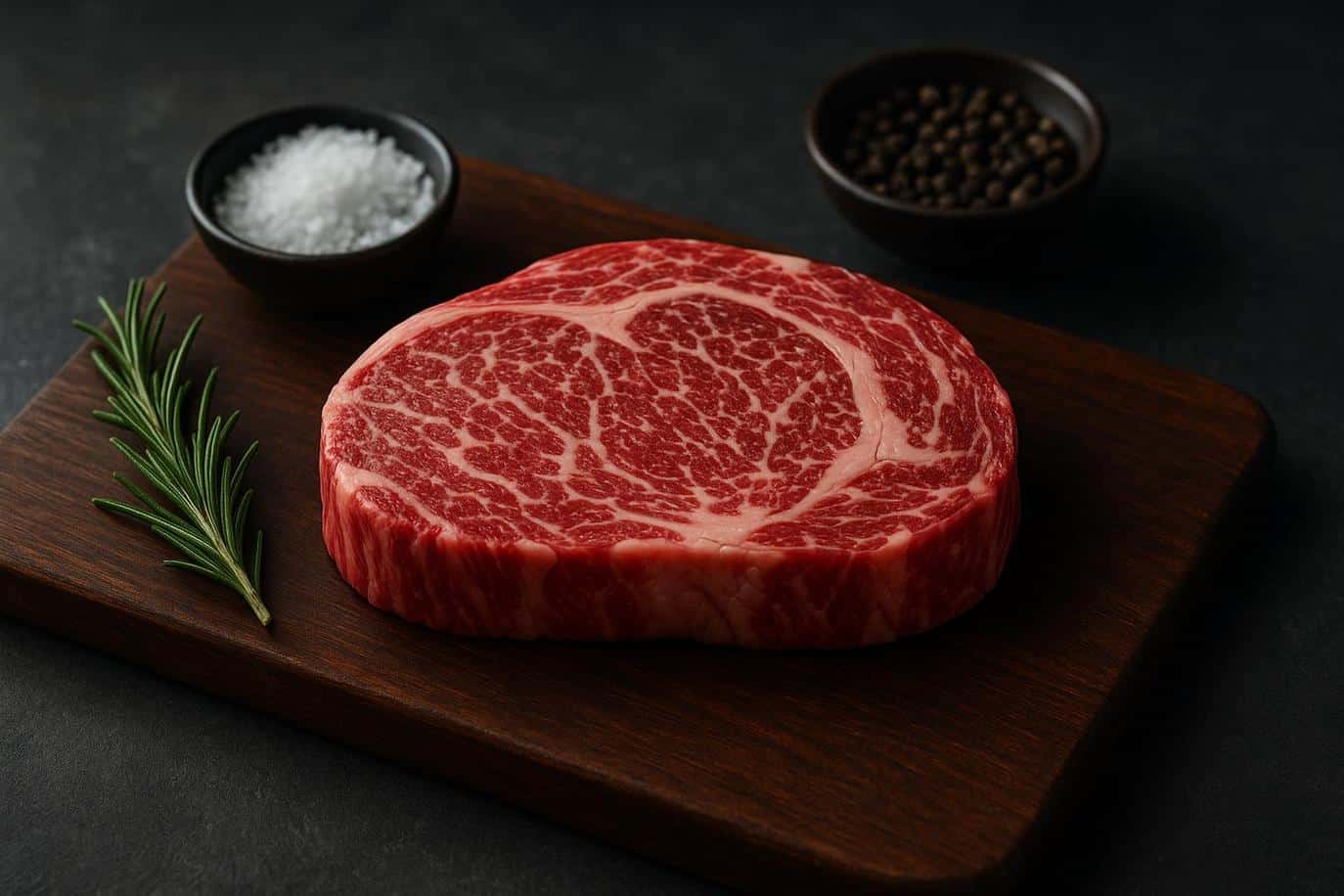Wagyu beef enjoys a storied reputation in culinary circles, often revered like fine wine or aged cheese. At the core of its appeal lies a superior breed of cattle originating in Japan. These cattle produce beef known for its intense marbling and velvety texture.
The fine web of intramuscular fat is not simply a visual cue; It’s directly responsible for the rich, buttery flavor that distinguishes Wagyu from its conventional counterparts. It is this distinctiveness that has made even ground versions of the meat a luxury item in kitchens across the globe.
These qualities elevate Wagyu from a regional delicacy to a global symbol of culinary artistry. As awareness grows, Wagyu continues to captivate chefs and consumers seeking an unparalleled dining experience. This introduction sets the foundation for exploring why Wagyu’s reputation is so well deserved.
The Allure of Wagyu: More Than Just a Name
What sets Wagyu ground beef apart from standard fare is not just the breed but the way it is raised. Authentic Wagyu cattle are carefully bred, often in small herds, and receive specialized care throughout their lives. The emphasis is on quality over quantity.
How Wagyu Cattle Are Raised for Excellence
These animals are fed a controlled diet promoting the even fat distribution that characterizes their meat:
- Grains
- Rice straw
- Beer (occasionally)
Conversely, conventional cattle are raised with efficiency in mind, sacrificing the complex flavors and premium fat structures that define Wagyu. For those exploring Wagyu ground beef, understanding what they’re purchasing is crucial.
Understanding the Wagyu Ground Beef Experience
The experience and expectations surrounding Wagyu go beyond mere taste. From grading standards and breed authenticity to sourcing practices and preparation techniques, several factors influence both quality and value. Understanding these elements helps ensure that consumers make informed decisions and truly appreciate the distinct qualities that set Wagyu apart from conventional ground beef.
The Science Behind Wagyu’s Marbling and Mouthfeel
Marbling is not merely an aesthetic feature—it is the linchpin of Wagyu’s sensory superiority. Fat, especially intramuscular fat, plays a crucial role in how flavor is perceived. When ground Wagyu is cooked, the low melting point of the fat ensures that it renders gently into the meat, delivering a rich, juicy bite that few other ground beef options can replicate. This melt-in-your-mouth quality is one of the primary reasons chefs and consumers alike are willing to pay a premium.
Understanding Wagyu’s Unique Fat Composition
The science of flavor extends beyond fat content. Studies show that Wagyu beef contains a higher proportion of monounsaturated fats, including oleic acid. These fats are associated with a more favorable flavor profile. Additionally, these fats are known to have a softer texture, which contributes to the beef’s tenderness. This scientific breakdown underscores why Wagyu ground beef often feels more indulgent and satisfying than other varieties, even in simple dishes like burgers or meatballs.
Why Wagyu Retains More Moisture Than Other Beef
Another significant aspect of marbling is its effect on moisture retention. Another benefit of Wagyu’s marbling is moisture retention. Unlike leaner beef, which can dry out quickly under heat, Wagyu maintains its succulence. This results in fewer cooking errors and a greater margin of forgiveness in preparation, particularly valuable for home cooks. The fat essentially bastes the meat from the inside, creating a naturally moist and flavorful product with less effort.

How Wagyu is Raised: From Pasture to Plate
Wagyu cattle are not raised through industrialized farming methods but rather through deliberate, hands-on practices that emphasize animal welfare and precision. The rearing process begins with careful genetic selection. Only cattle with a documented Wagyu lineage are considered for breeding, and each animal is registered to ensure pedigree integrity. This meticulous approach ensures the continuation of the unique traits that define the Wagyu eating experience.
Feeding Programs Tailored for Marbling Excellence
In addition to careful breeding, feeding practices play an equally pivotal role. Wagyu cattle are commonly fed a high-energy diet for much longer periods than conventional cattle. This extended feeding time, which can span over 600 days, allows for the slow and even development of marbling. Some producers go as far as to tailor feed programs to individual cattle, optimizing nutrition for the best fat quality and distribution. These efforts are labor-intensive and costly, contributing to the higher market price of the beef.
Creating a Stress-Free Environment for Quality Beef
The environment in which Wagyu cattle are raised is also carefully managed. Stress can adversely affect meat quality, so producers go to great lengths to maintain a calm and low-stress environment.
To ensure livestock well-being, some ranches use soft music, conduct regular health monitoring, and even employ massage therapy. These practices might seem extravagant, but they contribute to the consistent quality and flavor for which Wagyu is known.
The Economics Behind Wagyu’s High Price
Production Costs That Drive Wagyu’s Price
Wagyu ground beef is often priced several times higher than standard ground beef, raising the question: is it worth the cost? From a purely economic standpoint, the price reflects the complexity of production. Between the extended rearing time, specialized diet, and intense care, the cost of raising Wagyu cattle far exceeds that of conventional beef operations. As a result, consumers directly experience the cost of these practices.
How Brand Prestige Influences Wagyu’s Value
However, pricing is not solely about production costs. There is a significant value component attached to exclusivity and branding. Much like luxury goods in other markets, Wagyu benefits from its reputation and rarity. Supply is tightly controlled, especially for authentic Japanese Wagyu, which must meet rigorous grading criteria. Even American Wagyu, often a crossbreed of Japanese and domestic cattle, is subject to high standards that contribute to its market value.
How Wagyu Pricing Reflects Quality and Experience
From the consumer’s perspective, the premium may be justified not only by quality but also by the experience. Wagyu ground beef provides a unique sensory profile that is difficult to replicate. It elevates everyday meals into indulgent dining experiences, making it an appealing option for special occasions or discerning palates. The willingness to pay more stems from a combination of superior taste, artisanal production, and brand prestige.

Cooking Wagyu at Home with Confidence
Why Simplicity Works Best with Wagyu
Wagyu ground beef’s versatility extends beyond its flavor, making it a standout in the kitchen. Despite its gourmet reputation, Wagyu ground beef requires minimal preparation to achieve restaurant-quality results.
In fact, its natural richness allows for minimal seasoning, letting the inherent flavors shine. A simple preparation—salt, pepper, and a hot pan—can yield a result that feels restaurant-quality. This accessibility makes it attractive to home chefs seeking to elevate their meals.
Techniques for Preserving Wagyu’s Signature Texture
The fat content of Wagyu ground beef changes how it behaves during cooking. Unlike leaner options, it does not shrink as aggressively, and the flavor is more pronounced without the need for added fats. That being said, it’s important not to overcook Wagyu, as its lower melting point fat can quickly escape, taking much of the flavor with it. Medium rare to medium is often considered the ideal doneness for burgers or patties.
Dishes That Highlight Wagyu’s Richness
Wagyu also lends itself well to dishes beyond the burger:
- Hearty ragùs
- Gourmet meatballs
- Upscale tacos
- Shepherd’s pie
For those looking to make the most of their investment, pairing Wagyu with ingredients that complement its richness—such as umami-rich mushrooms, truffle, or aged cheeses—can amplify the experience.
Is Wagyu Beef Really Healthier?
At first glance, the idea of high-fat beef being “better” for you might seem contradictory. However, Wagyu beef contains a significantly higher ratio of monounsaturated fats compared to saturated fats, thanks to its oleic acid content. Monounsaturated fats have been associated with better heart health and cholesterol levels. Although beef isn’t typically considered a health food, Wagyu offers a surprisingly healthier fat profile.
Nutritional Benefits Beyond Fat Content
Beyond fats, Wagyu is also rich in essential nutrients such as protein, iron, zinc, and B vitamins. These are critical components of a balanced diet, supporting muscle growth, immune function, and energy metabolism. The high nutrient density of Wagyu means smaller portions can deliver more of what your body needs, making it a smarter choice in moderation.
Finding a Balanced Place for Wagyu in a Healthy Diet
Because of its richness, smaller portions of Wagyu are typically more satisfying, helping with portion control. It is not a meat that lends itself to daily consumption for most people, but it can be a beneficial addition to a well-rounded diet. The key lies in how it is prepared and integrated into meals, with balance and variety in mind.

The Verdict: Is Wagyu Worth the Hype?
The Emotional Value of Wagyu
For many consumers, the hype surrounding Wagyu ground beef is not merely about taste—it represents an experience. The culinary qualities, health benefits, and craftsmanship behind every bite elevate Wagyu far beyond a typical meat option. While it may not replace conventional beef for everyday use, it holds a special place for those seeking premium quality and flavor.
Whether enjoyed as a perfectly seared burger or folded into a delicate dumpling, Wagyu ground beef offers depth, complexity, and richness that are rarely matched. The unique attributes of the meat create a sensory experience that lingers far beyond the meal. For those who value flavor and are willing to invest in quality, Wagyu makes a compelling case.
Why Wagyu Represents Culinary Excellence
Wagyu ground beef earns its reputation through centuries of breeding, craftsmanship, and dedication—not marketing gimmicks. It’s a celebration of what beef can be when every element—from genetics to feeding to final preparation—is treated with care and precision. That is what makes it worth every bite.
Frequently Asked Questions About Wagyu Ground Beef
What makes Wagyu ground beef different from regular beef?
Wagyu beef is prized for its high intramuscular marbling, leading to a buttery texture, richer flavor, and superior tenderness compared to conventional beef.
Is Wagyu ground beef healthier than regular ground beef?
Yes, Wagyu contains a higher proportion of monounsaturated fats, such as oleic acid, which are considered better for heart health compared to the saturated fats found in regular beef.
How should I cook Wagyu ground beef?
Wagyu’s rich fat content makes it ideal for simple preparations. Use minimal seasoning and avoid overcooking to preserve its natural moisture and flavor—medium rare to medium doneness is typically best.
Why is Wagyu ground beef so expensive?
The high cost reflects careful breeding, extended feeding periods, meticulous animal care, and the meat’s superior marbling and flavor quality.
Can I use Wagyu ground beef in everyday dishes?
Yes! Wagyu can elevate everyday dishes like burgers, tacos, meatballs, and shepherd’s pie, making simple meals feel indulgent and gourmet.




